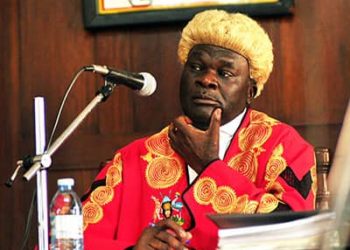The Principal Judge Flavian Zeija has invited members of the Uganda Law Society to meet and discuss the newly proposed guidelines governing bail applications for suspects and four other regulations.
The other proposed rules are; The Constitution (Sentencing Guidelines for Courts of Judicature) (practice) Directions, 2021, Judicature (Amicus Curiae) Rules, 2021, the Judicature (Court Bailiff) Rules, 2021, the Judicature (Representation at the Expense of the State) Rules, 2021 and the Judicature (Court Fees) Rules, 2021.
According to the invitation sent to the lawyers, the court rules of procedure and guidelines will be discussed with the view to improve effectiveness and efficiency in the administration of justice.
The Judiciary wants the lawyers to participate in the exercise by sending their documentary views to the Judiciary and then a physical meeting will be held on January 5, 2022 at Mestil Hotel in Kampala.
According to the 15 paged proposed guidelines, copy of which Uganda Radio Network has seen, the Chief Justice is proposing that bail money which has not been claimed within two years from the date of the order or refund should be forfeited and declared to the Secretary to the Judiciary who will then transfer it to the Consolidated Fund.
Currently, there is no limit within which one can be refunded money for bail which is always refundable at the end of the case whether one is convicted or acquitted.
Besides this, their right to be given bail remains a discretion of the Judge, and key other issues in the proposal are that while granting bail, the Judicial officers must balance the rights of the applicant and the interest of justice, the safety of the prosecution, applicant, victims, and the community and should as well consider views of the victims.
The Judiciary Public Relations Officer Jamson Karemani, indicated that the guidelines that were issued two weeks ago are not yet adopted and they are simply showing the judicial officers what to do and what not to do.
Karemani adds that the proposed guidelines have to be sent to lawyers to assess and give their opinions before they come up with final guidelines that will be adopted by the stakeholders.
The President of Uganda Law Society Pheona Wall Nabasa said that the guidelines are to ensure that the judicial discretion is exercised responsibly and it will help judicial officials in filling the gaps related to bail. She says that in some similar circumstances, someone is given bail and in another, it is denied.
In September, President Yoweri Museveni and Chief Justice Alfonse Owiny-Dollo clashed on the issue of granting bail to persons accused of capital offenses pending determination of their cases.
This was at the 4th Annual Memorial Lecture of the former Chief Justice Benedicto Kiwanuka held at the Judiciary headquarters.
Owiny-Dollo said bail is a constitutional right that is supposed to be either granted or denied upon the discretion of the presiding judicial officer who should also exercise that discretion judiciously.
However, Museveni said that the concept of dispensing justice has to be harmonized, challenging the judicial officers to go and read the Constitutional Commission proceedings where he says the majority of the people of Uganda didn’t want bail for capital offenses. But the former Chief Justice Benjamin Odoki who headed the Commission left it to the discretion of the judicial officers, which he is opposed to.
According to Museveni, granting bail is a provocation that will not be accepted. He gave examples of people who were killed by mob justice in Arua and Gomba district, saying that when courts keep giving bail on capital offenses, societies become hopeless and start killing people who are charged with such capital crimes.



